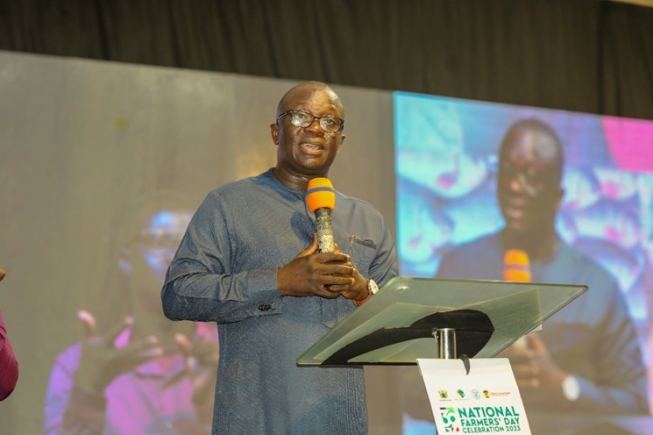
60,000 hectares ready for agric zones
The government has secured over 60,000 hectares of land for the establishment of agricultural zones in the Eastern, Ashanti, Upper West, Northern and North East regions.
Advertisement
This is a start-up activity to roll out the second phase of the Planting for Food and Jobs programme.
The Vice-President, Dr Mahamudu Bawumia, who made this known in his keynote address at the 39th National Farmers Day Awards Night held at the University of Mines and Technology (UMaT) at Tarkwa in the Western Region last Friday, said in 2024, government would complete the development of 50,000 hectares of land in land valleys to expand the areas under rice, soya and maize cultivation.
Additionally, he said work had begun on the development of 7,100 hectares of irrigated infrastructure in economic enclaves within the agriculture zones.
"We have set ourselves ambitious but achievable targets every year of the five-year period of the programme (PFJ 2.0).
For example, we expect to increase our self-sufficiency in rice from the current level of 48 per cent in 2022 to 72 per cent by 2025 and 106 per cent by 2028.
Poultry will be increased from five per cent in 2022 to 22 per cent by 2025 and 111 per cent by 2028.
Best farmer
The awards ceremony saw Charity Akortia from the Agona West Municipality in the Central Region being adjudged the Overall National Best Farmer for 2023.
Theophilus Ezenrane Ackah, from the Western Region, was the first runner-up, followed by Kwaku Yeboah Asumah.
The novelty event was graced by a host of personalities, including the Minister of Food and Agriculture, Dr Bryan Acheampong; Board Chairperson of the Minerals Commission, Barbara Oteng-Gyasi; the Board Chairman of Ghana Cocobod, Peter Mac Manu; Chief Executive Officer of Cocobod, Joseph Boahene Aidoo, and the Member of Parliament for Tarkwa-Nsuaem, George Mireku Duker.
It was chaired by the President of the Western Regional House of Chiefs and Paramount Chief of the Wassa Amenfi Traditional Area, Nana Tetrete Akuamoah Sakyi.
National Farmers Day
Dr Bawumia said the National Farmers Day had a lot of significance, hence its observance as a public holiday.
He said farmers and fishers were celebrated because they were the cornerstone of the country's economic development, contributing to the growth of industry through the supply of raw materials, foreign exchange earnings from exports, job creation, poverty reduction and the general well-being of the populace.
He applauded all agriculture staff and allied agencies and the country's development partners who helped to advance the government's agenda to modernise and transform the sector.
Dr Bawumia said Farmers Day must be an occasion to remind ourselves that the new dynamics called for a new strategy to enable the country to realise its goals of food security and resilience, job creation, poverty reduction and prosperity.
The Vice-President said the key issues hindering the nation's efforts of accelerating growth and transformation of agriculture in recent times were global conflicts disrupting supply chains, price hikes of inputs and their impact on food demand and supply, effects of climate change, outbreak of diseases, pollution of water resources and population explosion.
Sustenance
"These threaten our very sustenance as a people and, therefore, calls for bold and decisive decisions and innovative strategies to neutralise the drawback effect on developing agriculture," he said.
Dr Bawumia said the country's experience on the agriculture front in the past six years demonstrated government's unwavering commitment to transform the sector and place it on a sound footing of accelerated development.
The efforts put in by government since 2017 had yielded notable success through the flagship programme, Planting for Food and Jobs (PFJ), initiated in 2017.
"You would all recall that when you look at Ghana's agriculture growth between 2013 and 2016, in fact, it was a declining story.
"Average growth of agriculture between 2013 and 2016, he said, was 2.9 per cent, but when the PFJ was implemented in 2017 and in spite of the global economic challenges like the COVID pandemic, Russia-Ukraine war, disruption of supply chain, average growth in the agriculture sector between 2017 and 2022 was six per cent.”
Growth
"We have doubled agriculture growth, notwithstanding, so we must be doing something right," he said and added that "so we doubled the growth rate in the agriculture sector that we came to meet".
Dr Bawumia said the significant increase in the growth rate in the agriculture sector enhanced food security, increased job opportunities across the agriculture value chain and supported emerging industries with raw materials, among others.
He said the PFJ programme reached over 1.5 million farmers and resulted in a significant increase in productivity of some staples.
During the period, yields from maize production increased from 1.8 metric tonnes per hectare in 2016 to 3.3 metric tonnes per hectare by 2022.
On the other hand, rice, he said, increased from 2.9 metric tonnes to 4.5 metric tonnes per hectare during the same period.
The Western Regional Minister, Kwabena Okyere Darko Mensah, said when it came to agriculture, the region was the best.
Nana Sakyi, for his part, commended farmers for their hard work towards providing food for the citizenry.
The Vice-Chancellor of UMaT, Prof. Richard Amankwah, said the university worked on technology to support agriculture.



